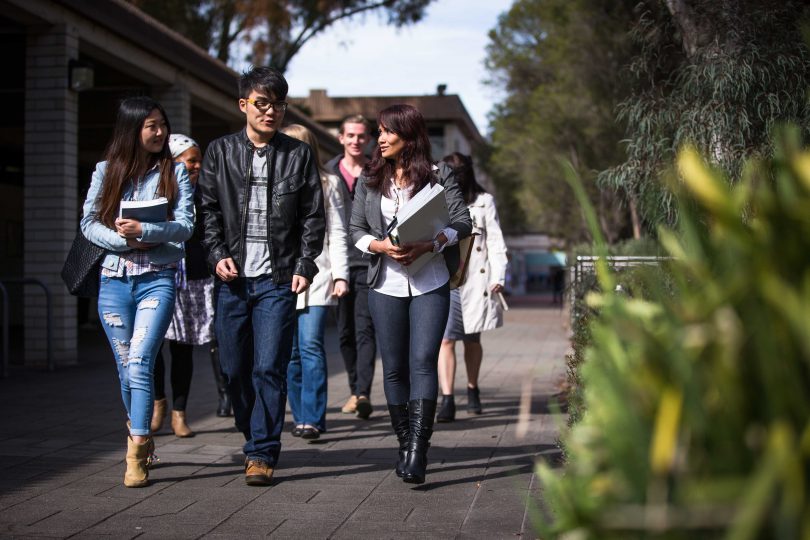
How long will it be before we see international students return to campus life in Canberra? Photo: File.
The Australian National University (ANU) and University of Canberra (UC) will continue pressing the ACT Government to develop a plan for the safe return of international students following the latest assumptions that Australia’s borders will remain closed until the middle of 2022.
Both ANU and UC have been working with the ACT Government and Federal Government to find ways to return international students since the COVID-19 pandemic hit in March 2020, and is pressing for them to return before the beginning of second semester in July this year.
ANU had offered to provide its on-campus residential facilities to safely quarantine its returning international students, as well as returning Australians, but this proposal was deemed unsuitable because it did not adhere to ACT Health’s “non-negotiable hotel quarantine accommodation requirements”.
ANU Vice-Chancellor Professor Brian Schmidt again spoke out about the lack of government support for universities to recover from the COVID-19 pandemic in the wake of the 2021-2022 Federal Budget that was handed down this week.
“With Australia’s borders closed for the foreseeable future, ANU is the canary in the coalmine,” wrote Professor Schmidt in an opinion piece for The Guardian.
“The cumulative effect of border closures on international student numbers will lead to other universities catching up with my university’s budget woes this year, and worse in the years beyond. This will have a crippling effect on Australia’s post-pandemic recovery.”

It was quiet at ANU’s usually bustling Kambri precinct last week. Photo: Michelle Kroll.
A spokesperson for the University of Canberra said its primary focus is the safety of its students who are anxious about returning to Canberra.
“Many of our international students continue to study online and are, in general, doing well,” said the spokesperson. “But they are anxious to return to Canberra to continue with their studies on campus and have indicated their willingness to follow all protocols to ensure their safe return.”
Universities Australia chief executive Catriona Jackson said keeping international students locked out of on-campus learning until mid-2022 poses very serious challenges for the nation’s universities.
“With assumptions around borders being shut until mid-2022 now baked into the Budget, the picture for universities will get worse,” she said. “There will be significant flow-on effects for the nation’s research capacity and jobs inside and outside universities.
“Australia’s university sector cannot sustain these losses without serious damage to national productivity and the country’s knowledge base.”
The sector took a $1.8 billion revenue hit in 2020, while ANU reported a financial deficit of $162.4 million last year.
Universities Australia conservatively estimates at least another $2 billion will be lost in 2021, against 2019 actual operating revenue.
It is estimated ANU contributes around $1.04 billion each year to the ACT economy through having students as customers, employees and tenants.
Ms Jackson said Australia’s universities would need to work together to develop a plan to safely return international students to on-campus classes.
“Governments across all jurisdictions need to come together with universities to develop a robust plan for the safe return of international students,” she said. “The plan would mean the careful quarantine of students from low-risk countries.”
Professor Schmidt said time is of the essence and ANU will continue doing whatever it can to bring students back to Canberra.
“It’s absolutely imperative we open our national border and return our international students as soon as we safely can,” he said. “Universities have plans in place to do this safely and are ready to act. We just need commitment from the government to act on them.”




















